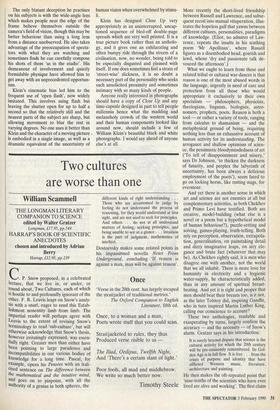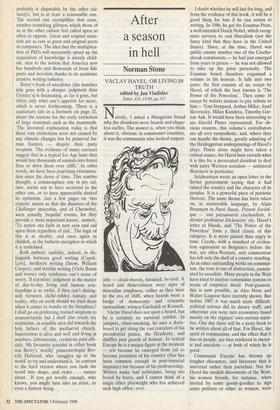Two cultures are worse than one
William Scammell
THE LONGMAN LITERARY COMPANION TO SCIENCE edited by Walter Gratzer
Longman, £17.95, pp.544
HARRAP'S BOOK OF SCIENTIFIC ANECDOTES chosen and introduced by Adrian Berry
Harrap, £12.95, pp.239
C. P. Snow proposed, in a celebrated lecture, that we live in, or under, or round about, Two Cultures, each of which is hostile to and profoundly ignorant of the Other. F. R. Leavis leapt on Snow's analy- sis with a snarl, eager to rend this Estab- lishment nonentity limb from limb. The impartial reader will perhaps agree with Leavis to the extent of revising Snow's terminology to read 'sub-culture', but will Otherwise acknowledge that Snow's thesis, however irritatingly expressed, was essen- tially right. Greater men than either have been pointing to large paradoxes and incompatibilities in our various bodies of knowledge for a long time. Pascal, for example, opens his Pensees with an itali- cised sentence on The difference between the mathematical and the intuitive mind, and goes on to pinpoint, with all the authority of a genius in both spheres, the
different kinds of right understanding . . . Those who are accustomed to judge by feeling do not understand the process of reasoning, for they would understand at first sight, and are not used to seek for principles. And others . . . do not at all understand matters of feeling, seeking principles, and being unable to see at a glance . . . Intuition is the part of judgment, mathematics of intellect.
Dostoevsky makes some related points in his impassioned novella Notes From Underground, concluding 'If reason is against a man, man will be against reason'.
More recently the short-lived friendship between Russell and Lawrence, and subse- quent recoil into mutual vituperation, illus- trates the hopeless gulf that yawns between different cultures, personalities, paradigms of knowledge. (Eliot, no admirer of Law- rence, repeats the insults in his scathing poem 'Mr Apollinax', where Russell figures as a disembodied head, goatish and lewd, whose 'dry and passionate talk de- voured the afternoon'.)
What we ought to learn from these and related tribal or cultural war-dances is that reason is one of the most abused words in the language, urgently in need of care and protection from all those who would appropriate it exclusively to their own specialism — philosophers, physicists, theologians, linguists, biologists, astro- nomers, prophets, poets. Reason is both a tool — or rather a variety of tools, ranging from calculus to shamanism — and the metaphysical ground of being, requiring nothing less than an exhaustive account of human activity for its understanding. The arrogance and shallow optimism of scien- ce, the pessimistic bloodymindedness of art ('To tell of disappointment and misery,' says Dr Johnson, `to thicken the darkness of futurity, and perplex the labyrinth of uncertainty, has been always a delicious employment of the poets'), seem fated to go on locking horns, like rutting stags, for evermore.
And yet there is another sense in which art and science are not enemies at all but complementary activities, as both Chekhov and Primo Levi have testified. Both are creative, model-building (what else is a novel or a poem but a hypothetical model of human behaviour?), puzzle-setting and solving, games-playing, truth-telling. Both rely on perception, observation, extrapola- tion, generalisation, on painstaking detail and dizzy imaginative leaps, on airy ele- gance and brute fact (whatever that .may be). As Chekhov rightly said, it is men who disagree one with another, not the world that we all inhabit. There is more love for humanity in electricity and a hygienic water-supply, he characteristically added, than in any amount of spiritual breast- beating. And yet it is right and proper that men should beat their breasts too, is it not, as the later Tolstoy did, inspiring Gandhi, who in turn inspired Martin Luther King, calling our conscience to account?
These two anthologies, readable and exasperating by turns, largely confirm the accuracy — and the necessity — of Snow's alarm. Gratzer says in his introduction:
It is surely beyond dispute that science is the cultural activity for which the 20th century will be pre-eminently remembered. Its Gol- den Age is in full flow. It is free. . . from the crises of purpose and identity that have afflicted Western music, literature, architecture and painting.
He then makes the oft-repeated point that 'nine-tenths of the scientists who have ever lived are alive and working'. The first claim
probably is disputable by the other cul- ture(s), but is at least a reasonable one.
The second one exemplifies that crass, number-crunching glibness which those of us in the other culture feel called upon so often to oppose. Great and original scien- tists are as rare as great and original poets or composers. The idea that the multiplica- tion of PhDs will necessarily speed up the acquisition of knowledge is merely child- ish, akin to the notion that America now has hundreds and thousands of bona fide poets and novelists thanks to its academic creative writing industry.
Berry's book of anecdotes (the humbler title goes with a sharper judgment than Gratzer's) is fascinating, as far it goes, but titbits only whet one's appetite for more, which is never forthcoming. There is a cautionary tale in a footnote on page 32, about the reasons for the early extinction of large mammals such as the mammoth. 'The favoured explanation today is that these vast extinctions were not caused by any climatic changes but by primeval hu- man hunters — despite their puny weapons. The evidence of many carcases suggest that in a typical Ice Age hunt they would lure thousands of animals into forest fires or drive them over cliffs.' In other words, we have been practising extermina- tion since the dawn of time. This sombre thought, a commonplace one in my cul- ture, seems not to have occurred to the other one, or to have appreciably dented its optimism. Just a few pages on 'two experts' assure us that the disasters of the Challenger spaceship, and of Chernobyl, were actually 'hopeful' events, for they provide a 'most important lesson', namely, 'To renew our faith in new seas and sail upon them regardless of risk'. The logic of this is as shoddy, and once again as childish, as the bathetic metaphor in which it is enshrined.
Both authors' inability, indeed, to dis- tinguish between good writing (Capek, Levi), mediocre writing (Snow, William Cooper), and terrible writing (Vicki Baum and worse) only reinforces one's sense of worry. If scientists' judgment in the matter of day-to-day living and human rela- tionships is so awful, if they can't disting- uish between cliche-ridden fantasy and reality, why on earth should we trust them when it comes to bombs or the biosphere? I shall go on preferring trained surgeons to acupuncturists but I shall also retain my scepticism, as sensible men did towards the holy fathers of the mediaeval church. Superstition is alive and well and living in numbers, laboratories, credulous paid offi- cials. My favourite scientist in either book was Berry's 'woolly' palaeontologist Bev- erly Halstead, who 'snuggles up to the world' to try and understand it, 'in contrast to the hard version where you bash the world into shape, and order . . nature about.' If you get woolly enough, who knows, you might turn into an artist, or even a human being.



















































 Previous page
Previous page